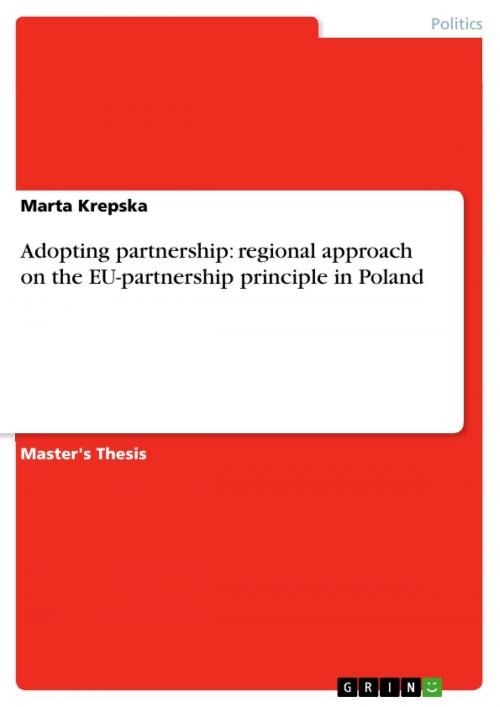Adopting partnership: regional approach on the EU-partnership principle in Poland
Nonfiction, Social & Cultural Studies, Political Science| Author: | Marta Krepska | ISBN: | 9783656266877 |
| Publisher: | GRIN Verlag | Publication: | September 4, 2012 |
| Imprint: | GRIN Verlag | Language: | English |
| Author: | Marta Krepska |
| ISBN: | 9783656266877 |
| Publisher: | GRIN Verlag |
| Publication: | September 4, 2012 |
| Imprint: | GRIN Verlag |
| Language: | English |
Master's Thesis from the year 2009 in the subject Politics - International Politics - Topic: European Union, grade: 1,7, Hertie School of Governance, language: English, abstract: Partnership has become a central principle of EU policies and is nowadays treated as a vital part of EU structural funds. The adoption of the partnership approach has been a challenge in the Polish public policy system throughout the 2004-2006 and 2007-2013 financial perspective periods. The thesis considers the adoption of the partnership principle at the regional level in Poland, focusing on the example of the Mazovia Monitoring Committee. It is concerned with the questions: How the expectations of the EU partnership approach are met in the regional practice? What is the actual role of social and economic partners in the decision-making process? How possible disparities between goals of the partnership policy and its outcomes can be explained? The evidence presented suggests that there is significant resistance in adopting the partnership principle in the Mazovia Monitoring Committee. The implementation reality does not live up to the expectations of the partnership assumptions expressed in the EU cohesion policy. Partnership has more mechanistic character of fulfilling donor's obligation than organic need of participatory working. In many aspects the partnership is a facade - it has an institutionalized form with limited content. This can be explained by political mechanisms contained in the partnership principle. Partnership is not a neutral good governance tool that requires primarily managerial response; it is an inherently political vehicle influencing relations between stakeholders, their interests and positions in the decision-making structures. The crucial element of partnership implementation is an approach of authorities, their interests to engage in partnership mechanisms. Therefore, stimulating of motivation, commitment and willingness to achieve interests of both sides through partnerships is essential for the policy success. In the partnership policy-making it should be rather looked for motivation than further formalization of the process.
Master's Thesis from the year 2009 in the subject Politics - International Politics - Topic: European Union, grade: 1,7, Hertie School of Governance, language: English, abstract: Partnership has become a central principle of EU policies and is nowadays treated as a vital part of EU structural funds. The adoption of the partnership approach has been a challenge in the Polish public policy system throughout the 2004-2006 and 2007-2013 financial perspective periods. The thesis considers the adoption of the partnership principle at the regional level in Poland, focusing on the example of the Mazovia Monitoring Committee. It is concerned with the questions: How the expectations of the EU partnership approach are met in the regional practice? What is the actual role of social and economic partners in the decision-making process? How possible disparities between goals of the partnership policy and its outcomes can be explained? The evidence presented suggests that there is significant resistance in adopting the partnership principle in the Mazovia Monitoring Committee. The implementation reality does not live up to the expectations of the partnership assumptions expressed in the EU cohesion policy. Partnership has more mechanistic character of fulfilling donor's obligation than organic need of participatory working. In many aspects the partnership is a facade - it has an institutionalized form with limited content. This can be explained by political mechanisms contained in the partnership principle. Partnership is not a neutral good governance tool that requires primarily managerial response; it is an inherently political vehicle influencing relations between stakeholders, their interests and positions in the decision-making structures. The crucial element of partnership implementation is an approach of authorities, their interests to engage in partnership mechanisms. Therefore, stimulating of motivation, commitment and willingness to achieve interests of both sides through partnerships is essential for the policy success. In the partnership policy-making it should be rather looked for motivation than further formalization of the process.















